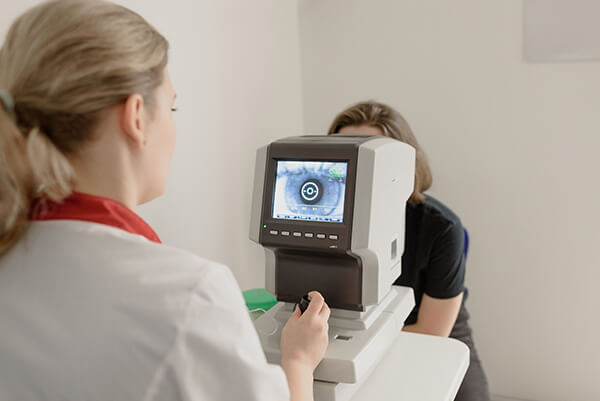If you've just received a new pair of glasses, whether due to a prescription change or just updating your style, it’s normal to experience some initial discomfort. You might feel dizziness or discomfort as your eyes adjust to the new lenses. This adjustment period is common and affects almost everyone.
To ease the transition, it's advisable to avoid long-distance driving or strenuous exercise for a few days. Try to wear your new glasses as much as possible to help your eyes adapt to the new prescription. Consistently wearing your new frames will accelerate the adjustment process. Avoid switching between your old and new glasses, as this can prolong the adaptation period.
Typically, it takes a few weeks for your eyes to fully adjust. However, if you continue to experience headaches or blurred vision after a week, it’s important to consult an ophthalmologist to ensure there are no underlying issues.

How Long Does It Take to Get Used to New Prescription Glasses?
Receiving a new pair of glasses should be an exciting experience, but for some, it can initially bring discomfort. It’s common to experience issues like dizziness, distorted vision, or eye fatigue when adjusting to new glasses. This is especially true for first-time wearers or those switching styles, as it may take some time to get accustomed to the new lenses.
Even minor prescription changes can affect how your eyes adapt, as the new lenses might differ slightly in size or shape from your old ones. This adjustment period is usually temporary and should resolve within the first week for most people. However, if you’re transitioning to progressive lenses or a significantly different frame style, it may take a bit longer to adjust.
If discomfort persists beyond a week or if you experience severe issues, it’s a good idea to consult with your optometrist to ensure everything is properly aligned and there are no underlying problems.

Frequently Asked Questions About New Glasses
Adapting to new glasses can sometimes be challenging. Understanding the common issues you might face can help you manage your transition more smoothly. Here are some frequently asked questions and their answers:
1. Why am I experiencing eye fatigue with my new glasses?
Eye fatigue is a common issue when adjusting to new glasses, especially in the first few days. If the fatigue persists beyond two weeks and is severe enough to cause headaches, you should consult your optometrist. It’s crucial to address any discomfort to ensure your glasses are correctly prescribed and fitted.
2. What is distortion or the "fish tank effect"?
Distortion, sometimes described as the "fish tank effect," can make objects appear warped or skewed, even though they are actually flat. This is more common with newly corrected astigmatism. If you continue to experience this sensation beyond a few days, it’s advisable to contact your optometrist for further evaluation.
3. Why am I having trouble with depth perception?
Difficulty with depth perception, or judging distances, can occur when your glasses prescription changes significantly. This issue is often temporary, but to ensure safety, avoid driving or operating heavy machinery until you’re more comfortable with your new glasses. In the meantime, it may be helpful to wear your old glasses while driving.
4. Why do I feel dizzy with my new glasses?
Dizziness is a common complaint, especially with multifocal lenses or significant changes in prescription. If the dizziness persists or is severe, it’s important to consult your optometrist. They can check if the glasses need adjustments or if another underlying issue needs to be addressed.
If you encounter persistent issues or have concerns about your new glasses, don’t hesitate to reach out to your optometrist for guidance and support.

When to See the Optometrist
Experiencing some discomfort when adapting to new glasses is normal. However, there are specific signs that indicate you should consult an optometrist:
-
Persistent Headaches: Headaches are a significant concern. If you experience ongoing headaches that do not improve within a day or two of wearing your new glasses, it’s crucial to seek professional advice. This could indicate that your prescription or the fit of your glasses needs adjustment.
-
Continued Blurred Vision and Dizziness: Blurred vision and dizziness can be common when adjusting to new glasses, but if these symptoms persist beyond a few days, it’s important to consult an optometrist. Persistent issues may signal a problem with the prescription or the lenses themselves.
-
Discomfort Despite Proper Adjustment: Sometimes, frames may not sit correctly on your face until they are properly adjusted. If you’ve made sure the frames are positioned correctly and are still experiencing discomfort after a few days, it’s time to consult your optometrist.
-
Inconsistent Lens Types: If the type of lenses in your new glasses is the same as your previous pair, but you’re still experiencing discomfort, an optometrist should review your glasses to ensure there are no underlying issues with the prescription or lens quality.

Tips for Quickly Adapting to New Glasses
Adjusting to new glasses can take some time, but following these tips can help make the transition smoother:
-
Wear Them Consistently: Start by putting on your new glasses as soon as you wake up. Aim to wear them for 2-3 hours initially, gradually extending the duration as you feel more comfortable. If you experience no discomfort, try wearing them all day. Consistent wear helps your eyes adjust more quickly.
-
Avoid Frequent Switching: Refrain from constantly switching between your new glasses and your old, more comfortable pair. This can prolong the adjustment period and make it harder for your eyes to adapt to the new prescription. Stick with your new glasses to help your eyes get used to them faster.
-
Wear Them During the Day: Try to wear your new glasses during the day rather than waiting until later. This helps your eyes adjust to natural lighting conditions and reduces the chance of disorientation.
-
Be Patient: Give yourself time to adapt. Most symptoms, such as mild discomfort or distortion, should subside within a few days. If discomfort persists beyond a week, or if you experience significant issues, consult your optometrist. For the best results, consider returning to the same optician for any adjustments.








































